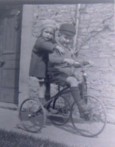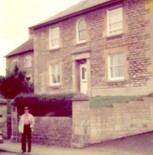
My earliest recollections are of Calne in Wiltshire where we lived from 1921 until 1925 and where my father's Baptist Church was in Castle Street. Our house was called 'The Manse' and was in North Street. The house opposite was occupied by a blind man of advancing age, a Mr Page, and a lady who was his housekeeper or his sister, I can't remember which, and who was also a qualified nurse. I was sent across the road occasionally to lead the old man to our house for a visit. He always used to say that to be blind was not as bad as being deaf, and since then, on reflection, I have come to think that he was right.
Whilst at Calne a friend of ours came to live with us who I knew as Auntie Lilly, though she was not at all related to us. It was here in Calne that my intense interest in railways began, possibly as a result of hearing the words 'red is for danger, green is for go' read to me by Auntie Lilly from a children's book. I used to pester her to take me down to the station to see the arrival of the '2.30', I think it was, the local steam 'push and pull' train from Chippenham where the branch line from Calne connected with the main line. There was one station in between Chippenham and Calne called 'Black Dog'. The Calne terminus was a typical country station with goods yard, goods shed and signal box. The branch line and station have long since disappeared, probably a casualty of the 'Beeching Cuts'.
On certain days my father had to go out to preach at a Baptist Chapel in some village or other and sometimes he would take me with him on his bicycle. I remember the gas lamp on the front of the bicycle with a tube leading to the rear lamp. The front lamp had a container which was in two halves, the top half for water and the bottom half for powder. The water dripped down into the white powder and the mixture produced the gas for the lamps [the white powder was calcium carbide which, when mixed with water, produces acetylene gas]. There was a little seat on the crossbar of my father's bicycle on which I sat. He also took me sometimes when he went shooting rabbits. I remember the long hot summers and the snowy winters.
The house, 'The Manse', was a substantial stone built structure, typical of that part of the country. There was a large sized garden with fruit trees and an apricot tree growing up the wall at the side of the front door. At fruit picking time my father laid out the apples in the loft on newspaper so that they did not touch one another. The house did not face the road but faced along it, so that the front door was at the side. It was built above the level of the road and approached by steps between stone walls up from the road which led to a path round to the front door. I had some local playmates of my own age or thereabouts and one of the pranks we used to get up to was sitting on the wall outside the house and shouting to passers-by a ditty which went 'stare, stare, like a bear, then you'll know me everywhere'. When my mother heard about this she rebuked me strongly for being so rude. There was very little traffic on the roads in those days and I could ride up and down the road outside the house on my tricycle with perfect safety. My sister Joan also occasionally rode my tricycle. The road was not surfaced with tarmac as it is now, and in the summer I used to like to tie a long knotted rope onto the back of my tricycle and pedal as fast as I could dragging the rope behind me and stirring up a cloud of dust.
A few yards up the road from where we lived was a nice old gentleman called Mr Gingell who ran a woodyard and I often went up to watch him and his assistant at either end of a long toothed saw cutting tree trunks into logs. The surrounding district was mainly agricultural and quite a lot of my time was spent around a local farm. There was no agricultural machinery as we know it today and the ploughing and other farming jobs were carried out by the use of large farm horses. The farmer used to let me lead one of the horses, they all had names and this particular one was known as 'Bob'.
Here, in Calne, I began my schooldays at a small private school in a private house run by a lady called Miss Reason who employed a lady teacher on her staff. I was probably sent there because I was considered by my parents as 'delicate' and unable to withstand the rigours of a council or church school. I now believe that my early education suffered as a result. The school was some distance from the house where we lived, at least it seemed to me to be a long walk being at the other side of the town and me being only about five or six years old. I had to take my lunch with me which had to be handed in on arrival so that it could be heated up at the appropriate time. I recollect that on the first day I went to school I did not hand in my lunch until lunch time which was by then too late to be heated up; just typical of me! Our playground was the small garden at the rear of the school and we ran down the garden path in a long line pretending we were a train.
My principal recollection of Calne is of the giant Harris's factory where sausages and pork pies were made, and of squealing pigs being driven into the factory to be made into sausages. It was outside or near this factory that I remember being suddenly awakened out of a daydream (again typical of me) by the warm breath of a horse which was pulling a cart, breathing down the back of my neck as I was standing in the middle of the road. There were more horsedrawn vehicles in those days than cars. I also remember being frightened by a black and white dog which put me off the canine fraternity for life. One other event of that period remains indelibly imprinted upon my memory. It was winter and I was on my way to school. There had been a considerable snowfall which lay quite thick upon the ground. I made a snowball and tossed it at a passing car. I was very young at the time, about six or seven years old, and whether or not I was on my own or with school friends I cannot remember The snowball hit the car with a bump. The car stopped and the driver got our and came towards me. Cars in those days were the exception rather than the rule and did not travel at the speeds they do today. I stood still, and when the driver reached me he held both my wrists in his strong hands, and, looking very severe, explained that his windscreen could have been smashed by the snowball and his face cut, and told me never to do that again. He was quite right, of course, and I have remained grateful to him for having taught me one of the many lessons I have had to learn during my lifetime.
My mother was of a very nervous disposition and highly strung. I well remember when we lived at Calne that on one occasion I was journeying with my mother to some place, I cannot remember where, which entailed a change of trains at Swindon. After waiting for a while on the platform, my mother enquired about when the other train was due and was told that the train she intended to connect did not leave from that station at all but departed from Swindon Town station (now no longer there) some distance away. My mother was frantic as time was running out, and she knocked frequently on the glass partition in the taxi telling the driver to go faster. We arrived at Swindon Town station just in time to catch the train which was just about to leave. That drive across Swindon from one station to the other is one experience indelibly stamped upon my memory, although at the time I was only very small. At some time, I cannot remember when, we travelled on the Somerset & Dorset Joint Railway (which unfortunately no longer exists). Where we were going to I cannot remember, but what stays in my memory is the railway coaches which were brightly coloured in blue.
My father was a strict 'teetotaller' and a member of the 'International Order of Good Templars'. I remember he used to dress up and don a colourful sash for their meetings. There was one occasion when my mother had had an accident and someone offered her a drop of brandy to make her feel better, but dad was dead against it. Whilst living at Calne, my father had to have an operation for the removal of some tubercular glands, for which he had to go to Swindon, or Bristol, I forget which, and I can picture him returning in a taxi - he was wearing a white scarf around his neck; the operation was in the vicinity of the neck. Later he had to have a second operation down the other side of his neck. He used to be a keen tennis player, but the operation put a stop to that. For Sunday services my father wore a black top hat which he polished diligently before he put it on, and a frock coat with tails. During the week he shut himself in his study and rehearsed his sermon for the coming Sunday aloud. In those days of 'Steam Radios' the wireless was powered by accumulators and these had to be charged up at regular intervals. My father, who was a bit of a wireless enthusiast, used to go to Bromsgrove to see Grandma Roberts and maintain her wireless set and change the accumulators. My mother and I used to go as well. There was no electricity at that house, only gas, but I liked the softness of the gas lights in preference to the glare of the electric lamps which were just being developed at that time. One day my mother sent me to a farm for me to collect some eggs. The lady there was attending to some new chicks just coming out of their shells. There was a small stove in which a fire was roaring. One of the chicks was very weak and lame and the lady quickly picked up the poor chick and put it on the fire. I was horrified at this and it is something I shall never forget.
